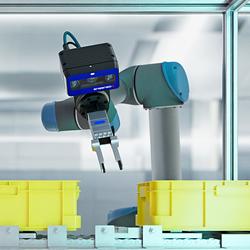Underwater robot to reduce costs and environmental impact for ships
Heriot-Watt University announces startup cohort for deeptech accelerator programme
A marine sector startup is developing an underwater robot that can substantially reduce fuel costs, maintenance needs and environmental impact for ships, boats and submarines by autonomously removing built-up microorganisms, plants and algae from hulls.
Buildup of organic growth on marine vessels, known as biofouling, is a significant challenge to the world's shipping industry and can cause damage to hull structures and propulsion systems. The accumulation of biofouling can also result in significantly increased drag of up to 60%, reducing speeds and increasing fuel consumption by up to 40%.
As part of the 6-month pilot, ScrubMarine aims to further develop complex navigation and control systems required for the real-world application of its robotic solution, utilising Heriot-Watt's array of experts from across its three global campuses and the cross-discipline research outputs of four global research institutes - including iNetZ+, the emerging Global Research Institute for Net Zero transition and beyond.
Clyne Albertelli, founder of ScrubMarine, said:
"In the vast ocean of innovation, ScrubMarine is committed to charting a cleaner and more efficient course for the marine industry. Our underwater robot, powered by deep-learning and supported by Heriot-Watt's DeepTech LaunchPad, aims to scrub away biofouling challenges, reducing fuel costs and environmental impact. Together, we're diving into a brighter and cleaner future for marine transportation."
The DeepTech LaunchPad, supported by Barclays Eagle Labs through the Department for Science, Innovation and Technology Digital Growth Grant, is providing six organisations with access to tailored services, facilities and equipment within Heriot-Watt and the National Robotarium, the world-leading centre for robotics and artificial intelligence based at the University's Edinburgh campus.
ScrubMarine joins five other highly innovative companies from sectors including self-care, prosthetics, and food services. These include Borobo Ltd, founded by industrial designer Alexandre Colle, which aims to advance a new robotics platform targeting enhanced power management and electronic board design.
GI Healthcare Industries, led by entrepreneur and engineer Aswath Ganesan Indra, is revolutionising food services with semi-autonomous cooking robots for institutional catering. Infinity DPM is creating advanced upper limb prosthetics through expert engineering and biomechanics by founder and mechanical engineer David Yeudall.
Janki Group, led by architect Aisha Janki Akinola, is building an AI-powered tattoo robot system for the personal self-care industry, whilst Wynter Robotics is building mobile robotic solutions for construction industry applications such as measuring, bricklaying, and wood frame assembly.
The six successful companies will receive training and support from the university's commercialisation team, helping them to become investment-ready with proven prototype products, industry partners and a viable route to market.
Jamie Allan is Heriot-Watt University's Deeptech Launchpad programme leader. He said:
"The DeepTech LaunchPad marks an incredibly exciting step in strengthening Scotland's innovation ecosystem and establishing Heriot-Watt as a global leader in commercialising deep technology research. As an international university with campuses and partnerships spanning the world, Heriot-Watt is uniquely positioned to help entrepreneurs translate their ideas into transformative and commercially viable solutions.
"Through this pilot programme, our six-strong cohort will gain access to world-leading facilities like the National Robotarium as well as our vast network of international industry connections, experts and alumni to accelerate their cutting-edge research toward commercial success on the global stage. By fostering this collaboration, we empower the translation of deep science into transformative solutions ready to make real-world impact.
"We eagerly anticipate the fruits of this hands-on commercialisation experience and look forward to continued engagement with these innovators as they bring remarkable technologies to market across critical sectors like medical devices, food technology, robotics, and sustainability."
Grant Wheeler, Head of Commercialisation at Heriot-Watt University, said:
"Having a deeptech accelerator is one of the missing pieces in Scotland's entrepreneurial ecosystem and will allow our nation to create companies that can compete on an international scale.
"By giving external entrepreneurs access to the same expertise and facilities as our internal teams, the DeepTech Launchpad levels the playing field and fertilises high-growth businesses with world-changing potential."
Applications for the next cohort open in mid-2024 following evaluation of the pilot. Heriot-Watt intends to scale up the programme and potentially expand to other Scottish universities if this first round proves successful.
Featured Product

3D Vision: Ensenso B now also available as a mono version!
This compact 3D camera series combines a very short working distance, a large field of view and a high depth of field - perfect for bin picking applications. With its ability to capture multiple objects over a large area, it can help robots empty containers more efficiently. Now available from IDS Imaging Development Systems. In the color version of the Ensenso B, the stereo system is equipped with two RGB image sensors. This saves additional sensors and reduces installation space and hardware costs. Now, you can also choose your model to be equipped with two 5 MP mono sensors, achieving impressively high spatial precision. With enhanced sharpness and accuracy, you can tackle applications where absolute precision is essential. The great strength of the Ensenso B lies in the very precise detection of objects at close range. It offers a wide field of view and an impressively high depth of field. This means that the area in which an object is in focus is unusually large. At a distance of 30 centimetres between the camera and the object, the Z-accuracy is approx. 0.1 millimetres. The maximum working distance is 2 meters. This 3D camera series complies with protection class IP65/67 and is ideal for use in industrial environments.
